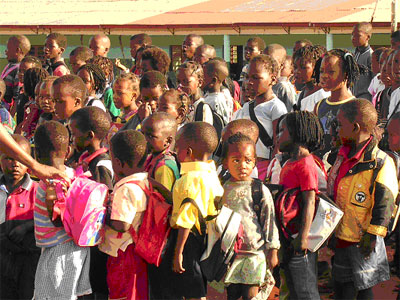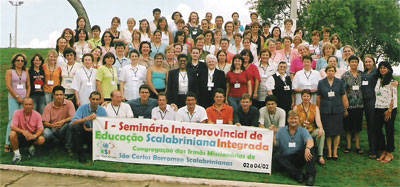|
Scalabrinian
Education
"The
Congregation dedicates itself to Christian education as a basic way of carrying
out its specific mission, because Christian education helps human beings grow on
all levels and makes them capable of giving a conscious and free response, as
befits children of God, to the plan the Father has for them personally and for
the world” (Constitutions of the Scalabrinian Missionary Sisters, 115).

The
Scalabrinian Congregation undertakes Christian education as
a special way of promoting the “new”, especially for those who are in their
formative period. Scalabrinian Sisters’ schools in their various contexts and
countries have the main aim of building up a more humane, welcoming, soldidary
and fraternal society, which hands on culture, but above all educates
in faith and life. The values of tolerance, acceptance of differences and
friendship therefore permeate relations among members of the educational
community.
 The
incorporation of schools into the Integrated Scalabrinian
Education Network has made it possible to give a specific character to
education, fixing its special features in what stimulates the very values of “Scalabrinianity”.
Regular meetings have the aim of continuing the training of educators on the
local, provincial, interprovincial and regional levels, bearing in great
consideration the educational dream of Bishop Scalabrini, Father Joseph and
Mother Assunta Marchetti, who saw education as one of the main ways of human
promotion, cultural development and the capacity to understand ourselves and
others. The
incorporation of schools into the Integrated Scalabrinian
Education Network has made it possible to give a specific character to
education, fixing its special features in what stimulates the very values of “Scalabrinianity”.
Regular meetings have the aim of continuing the training of educators on the
local, provincial, interprovincial and regional levels, bearing in great
consideration the educational dream of Bishop Scalabrini, Father Joseph and
Mother Assunta Marchetti, who saw education as one of the main ways of human
promotion, cultural development and the capacity to understand ourselves and
others.
According to article 116 of the MSCS Sisters’ Constitutions,
Scalabrinian schools are updated cultural centers which, in their dynamic
teaching methods, try to produce consciences that promote life and attitudes of
respect to it. The curricula are therefore rich in elements that lead students
to love of God and neighbor – who, in the Scalabrinian perspective, is the
neediest migrant, in other words someone met along the way, who calls to the joy
of living together and sharing gifts, culture and life.
One of the great challenges to Scalabrinian educators is that
of using every means of promoting welcoming and serene relations between
educators and students, especially encouraging the latter to an encounter with
others, even if they are different in their ethnic, cultural, social, religious
and economic manifestations – differences that carry with them traces of the
mystery of God as made flesh in Jesus Christ. Again in the Scalabrinian
perspective, welcome supposes that space is given to the other so as to walk
side by side with him or her, together facing the problems of humankind,
developing a culture of peace and tolerance, learning the rules of living well
together and harmonizing differences in a process of true freedom.
The quality of the education provided means that our schools
are a laboratory of fraternal life in common, a cry of hope in a more humane,
harmonious and friendly world, and hence a world more able to bring people to
their final goal, “that they may be one, even as we are one” (John 17:11), for
“so then you are no longer strangers and sojourners, but you are fellow citizens
with the saints and members of the household of God” (Ephesians 2:17).

|